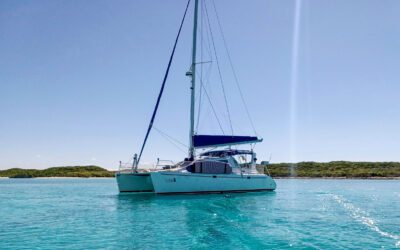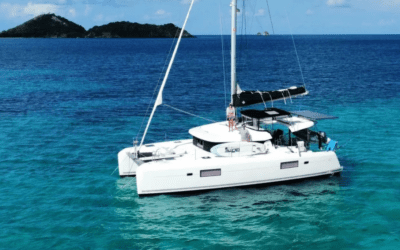
THE BUY
Buying a used catamaran is a delicate process as emotions run high for both buyers and sellers. We work closely with you to achieve your ultimate goal – and hope to establish a lifelong relationship in the process!
Firstly, we must identify what you have in mind, what you want the boat to do, your boat budget, and if you have a specific timeframe to begin using your catamaran. Based on your answers to these and a few other questions, we can communicate the right information to you at the right time, saving you from having to filter through dozens of inadequate boats or missing out on the opportunity of a lifetime. Not to worry if you are not yet ready to buy; some of our clients take a few years to make their dream happen – and we’re there through every step of the learning process.
Once we have found the catamaran you wish to make yours, here is what to expect…
1. Submitting Your Offer
An offer to buy is more than just the offer amount. Creating value in your offer terms is just as important.
We pride ourselves in achieving the ultimate win-win scenario. By having a good rapport within the industry and sellers as a whole, we break down the barriers to achieving your goal. Knowing what is important to the seller will help us to structure your offer and create value for both parties.
A formal offer is written on a Purchase Agreement. The basic components to your offer are:
• Offer Amount: what price are you willing to offer?
• Offer expiration date: when will your offer expire?
• Terms of Sale: what is your offer to buy “subject to”?
• 10% Deposit: a “good faith” deposit of honest interest to purchase said vessel
• Acceptance Date: when you decide that you will move forward with the deal after conducting a sea trial and survey
• Closing Date: when are you ready to take ownership of the vessel
Your Terms of Sale can vary, but we usually recommend…
1- Personal Inspection (You require that you view the vessel prior to accepting. This grants you the right to cancel the agreement if you don’t like what you see.)
2- Marine Survey (Hire a 3rd party professional marine surveyor to inspect the vessel. We recommend a certified SAMS or NAMS surveyor that is experienced with catamarans. Your insurance company will require the Survey Report.)
3- Sea Trial (Usually done the day of your survey inspection with the surveyor onboard.)
You can exclude any of the above terms or include additional terms, such as “Subject to Financing”. If you plan to finance, we must add this to your agreement so that your deposit is protected in the event your financing does not go through. If you need financing please visit our resources with names of Finance and Insurance companies that have been used by our clients.
An average sale from Offer to Closing can take place in as little as a month, with a typical timeframe as follows:
Offer Date: Today
Offer Expires: 2-3 days
Acceptance of Vessel: 2 weeks from today
Closing date: 1 month from today
It is important to note your deposit is fully refundable up until your Acceptance of Vessel date. If we cannot fulfill your Terms of Sale prior to your Acceptance of Vessel date, we will submit a request to the seller to push back the dates or reject the vessel outright in order to protect your deposit. It is also important to note that California and Florida are the only states that regulate escrow accounts and require yacht brokers to have a license.
Also included with your offer is an “Exhibit A”, which is usually comprised of the listing advertisement information, so that both parties are in agreement as to what is actually being sold. If a specific item onboard is not included in the Exhibit A, and is important to you, we recommend adding it so that both parties can agree the item is to be included.
Once you have filled-in your agreement, signed each page, including the Exhibit A and are in receipt of your 10% deposit, we are ready to submit your offer to the seller.
All funds are held by licensed brokers. Under Florida law, brokers have Escrow Accounts specifically for vessel deals.
2. Offer Negotiations
After we submit your offer to the seller, they can either (1) accept your offer as it is; (2) send back a “counter offer” with changes to your offer; or (3) reject your offer outright. Usually, the seller will come back with a counter offer and this negotiation continues until the offer terms are agreeable to both parties. Once agreed, we are “Under Contract”.
3. Under Contract
At this stage, the seller has agreed to your offer and we will need to prepare the next steps to fulfill your terms prior to your Acceptance of Vessel date. We will help you coordinate boat yard hauls, surveyor schedules, captain schedules, lender schedules, travel schedules, etc. so that your terms of sale are fulfilled on time and stress free.
Because a Marine Survey and Sea Trial are common, here is what you can expect:
• The seller is responsible for moving (or hiring a Captain to move) the vessel to the yard location for survey and captain the sea trial. (It is, after all, still his boat.)
• The buyer is responsible for payment to his surveyor and payment to the yard for haul. (They are, after all, your terms).
The survey and sea trial are typically held the same day, limiting the costs involved for everyone. Your surveyor and your broker will be present at the boat early in the morning (8/8:30-am) in order to hear the engine at first crank, a “cold engine start”. You do not have to attend your survey, but most buyers do. Your surveyor will proceed to check the vessel’s systems and equipment while the boat is in the water.
A survey haulout is usually scheduled for mid-day with a hang in the slings for about an hour; this gives your surveyor plenty of time to inspect the hulls of the vessel.
After your surveyor inspects the bottom of the hull, the vessel is put back into the water and we take her out for a sea trial. The sails should be raised to be inspected.
By 4pm, we are usually back on the dock and while the surveyor’s written report is not yet available, this is the best time to discuss any major findings with him while it is all fresh in mind. You will be given a full Survey Report in 1-2 days. Don’t fret; it is completely normal for a yacht (even new) to have deficiencies! It is especially helpful to go over the initial findings with your broker at the end of the day in order to determine a strategy for the next step and if a “Conditional” acceptance should be considered.
It is also important to note – yacht insurance and your financing is dependent on a survey. (We can provide a number of client recommended Insurance Brokers, Lenders and Surveyors)
4. Acceptance of Vessel
If the Sea Trail and Survey Report were positive and successful, you can decide to sign the Acceptance of Vessel (AOV) any time on or before your Acceptance of Vessel date.
Once the surveyor report is received, you can also request adjustments in price based on the report. This can be negotiated with the seller in either repairs or compensation for repairs. This is known as a Conditional Acceptance of Vessel (CAOV).
It has to be noted that, because you are buying a used vessel, you cannot expect to focus on items that are viewed as normal ‘wear and tear’. It is usually a rule of thumb that only large ticket items are negotiated in post-survey adjustments. These will include the large working items of a vessel, namely the sails, engines, navigational equipment and not a faulty light in the bathroom, or the scratch in the door etc. If major items were disclosed before the offer to purchase the vessel, these items cannot be used in a post-survey adjustment. Only newly discovered items should be brought into this negotiation.
Remember, this is a ‘used’ vessel. You cannot expect a seller to replace with new. Many buyers think that they will negotiate the price down after survey, but this is not the case. The time to get the best price for the vessel is during the offer process.
If you do not want to accept the vessel, you will need to submit your rejection in writing before the deadline (email, fax, etc. is just fine). You do not even have to give a reason for the rejection. If you do not accept or reject the vessel on or before your Acceptance of Vessel date, it will be deemed as an automatic rejection of vessel.
If you cannot send your written acceptance on time, speak with us as soon as possible to either request for an extension, or reject the vessel and submit a new offer when possible. Usually an extension is accepted by the seller if there is a valid reason.
Should there be repairs contingent on an acceptance, ask your surveyor if he is able to return to the vessel to confirm repairs have been completed successfully. This needs to be signed off on before the Acceptance is in effect.
Upon Acceptance of Vessel, you are now in the final stage of vessel purchase, and getting ready to close.
5. Final Closing
The Closing Date, which is usually set for two weeks after the Acceptance of Vessel date, allows for the time it requires to bring together all the items necessary to transfer ownership. The Closing Date is an outside date and oftentimes happens sooner.
Basically, a closing takes place once both of the following items are in place: firstly, the FULL and CLEARED closing funds have been received into the buyer broker’s Escrow Account (most lending companies will only wire the financed funds on the day of closing); and secondly, the Documentation agent is in possession of all the necessary ORIGINAL documents from the seller.
There are a few things to be aware of during the closing process:
1. Have you chosen a documentation agent? A Documentor offers a professional service to draw up bills of sale, any legal paperwork to transfer ownership of the vessel, as well to provide services to register and /or document your vessel upon closing. Our closing department will be working in conjunction with your Documentation Agent.
2. Are you going to register your boat in Florida and pay the 6% Florida Sales Tax? If not, you will be issued with a 90 Day Removal Affidavit. The 90 Day Decal will be affixed to your vessel upon closing and you will have 90 days to remove the vessel from Florida. You will need to mail in proof that your vessel has indeed left – usually a copy of a dockage bill will suffice.
3. Provide information of your Financing representative, if necessary. The details of the financed amount needs to be included in the closing statement for the vessel and special arrangements are made to make sure all necessary financed closing funds are received in a timely manner. Again, our closing department will liaise with the Financing Company to confirm all necessary documents are received and sent between the buyer and Documentation agent etc.
4. Full and cleared closing funds are to be received before closing can take place. It is the responsibility of the buyer to make sure that closing funds are received in a timeous manner. A closing statement will confirm the final closing funds required.
5. Make sure that your Insurance is set to take effect on the day of closing.
6. Do you have dockage arranged for ownership?
7. Do you need a captain to help you move or delivery your boat if necessary?
8. Do you have a service company arranged to perform any needed upgrades? Keep in mind, of course, that Just Catamarans is the largest catamaran service company.
Remember, Just Catamarans is always still available for you through this process.
Congratulations! You are now the owner of a catamaran. Thank you for giving us the opportunity to help you. We look forward to your cruising updates and sailing stories! Anything we can help you further with, please don’t hesitate to contact us.



